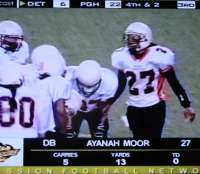The Pittsburgh Passion Project (2008-2009) probed the relationship between gender identity and sports practices through contemporary performance.
In the American imagination, the contours of helmet, football pads, and protective gear have historically signified a male body. But the reality of women bearing football’s armor arouses questioning of skill and curiosity of spectacle by the larger public. Athletic excellence, namely running with a ball in hand, is perceived as a male quality, not that of a woman. My participation in full-contact women’s football aimed to challenge these constructions and expand such critiques to a larger American society whose women continue to confront sexism and fight for gender equality. The Pittsburgh Passion Project (2008-2009) probed the relationship between gender identity and sports practices through contemporary performance, re-contextualizing sites of desire and fantasy through athleticism. The Pittsburgh Passion Project highlighted an aesthetic of failure as much as it challenged gender politics. As a rookie running back, I earned little playing time and was often hurt badly in practice. Ironically, Mistaken ID, provided the most visible public attention I would earn. I was misidentified as the defensive back on the opposing team during a televised broadcast.
The Pittsburgh Passion Project (2008-2009) probed the relationship between gender identity and sports practices through contemporary performance.
In the American imagination, the contours of helmet, football pads, and protective gear have historically signified a male body. But the reality of women bearing football’s armor arouses questioning of skill and curiosity of spectacle by the larger public. Athletic excellence, namely running with a ball in hand, is perceived as a male quality, not that of a woman. My participation in full-contact women’s football aimed to challenge these constructions and expand such critiques to a larger American society whose women continue to confront sexism and fight for gender equality. The Pittsburgh Passion Project (2008-2009) probed the relationship between gender identity and sports practices through contemporary performance, re-contextualizing sites of desire and fantasy through athleticism. The Pittsburgh Passion Project highlighted an aesthetic of failure as much as it challenged gender politics. As a rookie running back, I earned little playing time and was often hurt badly in practice. Ironically, Mistaken ID, provided the most visible public attention I would earn. I was misidentified as the defensive back on the opposing team during a televised broadcast.

